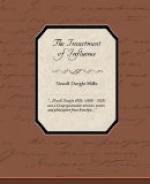To come forward as a friend of these endungeoned was to incur the risk of arrest and death, while to remain in hiding was to leave friends to die of starvation. Then men counted life not dear unto themselves. Heroism became a contagion. Even children dared death. An old painting shows the guard awakened at midnight and gazing with wonder upon a little child thrusting food between the iron bars to its father. In the darkness the soldiers sleeping in the corridors heard the rustling garments of some maiden or mother who loved life itself less than husband or friend. These tides of sympathy made men strong against torture; old men lifted joyful eyes toward those above them. Loving and beloved, the disciples shared their burdens, and those in the prison and those out of it together went to fruitful martyrdom.
When the flames of persecution had swept by and, for a time, good men had respite, Apollos recalled with joy the heroism of those without the prison who remembered the bonds of those within. With leaping heart he called before his mind the vast multitudes in all ages who so fettered through life—men bound by poverty and hedged in by ignorance; men baffled and beaten in life’s fierce battle, bearing burdens of want and wretchedness, and by the heroism of the past he urged all men everywhere to fulfill that law of sympathy that makes hard tasks easy and heavy burdens light. Let the broad shoulders stoop to lift the load with weakness; let the wise and refined share the sorrows of the ignorant; let those whose health and gifts make them the children of freedom be abroad daily on missions of mercy to those whose feet are fettered; so shall life be redeemed out of its woe and want and sin through the Christian sympathy of those who “remember men in the bonds as bound with them.”
Rejoicing in all of life’s good things, let us confess that in our world-school the divine teachers are not alone happiness and prosperity, but also uncertainty and suffering, defeat and death. Inventors with steel plates may make warships proof against bombs, but no man hath invented an armor against troubles. The arrows of calamity are numberless, falling from above and also shot up from beneath. Like Achilles, each man hath one vulnerable spot. No palace door is proof against phantoms. Each prince’s palace and peasant’s cottage holds at least one bond-slave. Byron, with his club-foot, counted himself a prisoner pacing between the walls of his narrow dungeon. Keats, struggling against his consumption, thought his career that of the galley-slave. The mother, fastened for years to the couch of her crippled child, is bound by cords invisible, indeed, but none the less powerful. Nor is the bondage always physical. Here is the man who made his way out of poverty and loneliness toward wealth and position, yet maintained his integrity through all the fight, and stood in life’s evening time possessed of wealth, but in a moment saw it crash into nothing and fell under bondage to poverty. And, here is some Henry Grady, a prince among men, the leader of the new South, his thoughts like roots drinking in the riches of the North; his speech like branches dropping bounty over all the tropic states, seeming to be the one indispensable man of his section, but who in the midst of his career is smitten and, dying, left his pilgrim band in bondage.




